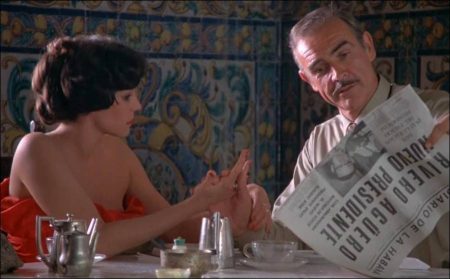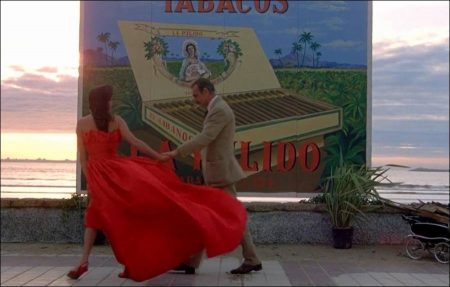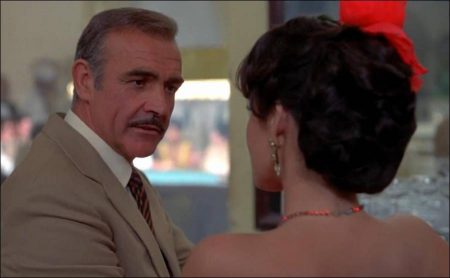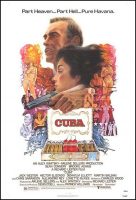Taglines: Part Heaven… Part Hell… Pure Havana.
Cuba movie storyline. In director Richard Lester’s Cuba, Sean Connery plays British soldier-of-fortune Robert Dapes, sent to Havana during the last days of the Batista regime. He is supposed to train Batista’s soldiers for their upcoming confrontations with Castro’s followers.
As Dapes becomes increasingly sympathetic towards the rebel cause, he takes a few precious moments to renew his romance with Alexandra Pulido (Brooke Adams), who is now married to Juan Pulido (Chris Sarandon). The basic thrust of the film is that unchecked capitalism is perfectly capable of collapsing under its own weight — and that lofty idealism can be easily forgotten once absolute power is within one’s grasp.
Cuba is a 1979 American Technicolor neo noir adventure film directed by Richard Lester and starring Sean Connery, portraying the build-up to the 1958 Cuban Revolution, filmed in Panavision. Neil Sinyard in his The Films of Richard Lester wrote that the film, “developed originally out of an idea of Lester’s own, inspired by a conversation with a friend about great modern leaders. From there Lester’s thoughts began to formulate in complex ways around Castro and Casablanca (1942) and out of that audaciously bizarre combination comes Cuba.
Film Review for Cuba
No film shamelessly advertised with the tagline “Part Heaven… Part Hell… Pure Havana” can possibly be all good. To be fair to 1979’s Cuba, though, it’s nobody’s fault but the marketing department’s that they heard “Sean Connery plays a British government agent…” and immediately tired to figure out how to sell this cool and slow-moving anti-romantic anti-thriller as a distaff James Bond picture.
But it’s unlikely that it would have been possible to sell it as the thing it actually was. Not because Cuba is uninteresting – exactly the opposite. But its interest is in part because of how thoroughly unusual it is, to the point that it sometimes breaks the movie. It is none of the things that it seems like it should be, and while that’s great for its personality, it’s a bit thorny for it as a movie for people to watch.
The setting is Cuba, in the weeks and days immediately preceding the revolution on 1 January, 1959 (the film has the misfortune to commit its most profound error as its first narrative gesture after the opening credit sequence: onscreen text sets the action in 1959, when virtually all of it happens in December, 1958. It’s a shockingly obvious mistake that makes it hard to take anything that follows entirely seriously).
Connery’s distinctly non-Bondian character is Robert Dapes, a miltary officer turned mercenary, who arrives in the politically tense Havana on the invitation of Batista’s government in the form of General Bello (Martin Balsam), to offer advice and support in suppressing the Communist rebellion of Fidel Castro.
While there, he encounters Alexandra Lopez de Pulido (Brooke Adams), an ex-lover who has returned home to marry a wealthy plantation owner, Juan (Chris Sarandon). While in the country, Robert finds that the exploitative business classes picking at Cuba’s bones are cruel enough that it’s not worth using his time to help prop the old regime up, while the Communist guerrillas are too indiscriminate in their radical violence to support them. Which leaves only “stay alive long enough to get the hell out and take Alexandra with” as far as plans go.
That is, mind you, the summary version of the script by Charles Wood. The actual film has far less direction, spending a good half of its running time looking around pre-revolutionary Cuba, frequently not even using the fig leaf of Robert’s presence. At times, it’s barely a narrative at all, and when it is, it’s a deliberately unsatisfying one, subverting the expectations of both of its main plotlines:
The politically shiftless mercenary who discovers the human element of the system he’s cynically inhabiting, and the open Casablanca riffing (like, really, really open) inherent to ex-lovers reuniting against a politically-charged backdrop. It’s an unconventional approach to what could easily be yet another in the endless line of movies about doomed love during historical flashpoints – the approach taken in this very same setting by 1990’s Havana – and the film deserves plenty of credit for its bravery.
The question, then, is whether it deserves points for its execution, and on this point I am quite undecided. It’s not exactly right to say that the film’s “problem” is that it was directed by Richard Lester – in fact, Lester originated the project, so the alternative to a Lester Cuba is no Cuba at all. There’s no way around it, though: he’s a weird fit for the material.
All of the director’s best-known and most significant projects – the Beatles vehicle A Hard Day’s Night, Palme d’Or winner The Knack… and How to Get It, the Salkind-produced megaproduction of The Three Musketeers – are united by a goofy, kinetic sensibility, one that oozes an unspoken “holy crap you guys we’re making a mooooooveeeeeee” glee, entirely about having a whole lot of broad fun even when the films in question aren’t comedies (though he tends to blur “comedy” and “not-comedy” – this is the man who was assigned the scraps of Richard Donner’s Superman II and figured out how to turn them into the first superhero farce). The only one of his films besides Cuba that I’ve seen without any meaningfully protracted comic energy is Robin and Marian from 1976, his other collaboration with Connery, and that is, when all is said and done, a Robin Hood movie.
The skill set that Lester had developed over his years as a filmmaker were, then, not by any means a natural fit for a serious drama about a real-life political event whose ramifications were still piping hot twenty years after the fact. I do not say this to beat up on Cuba, merely to point out what a peculiar beast it is, combining gorgeous Spanish locations, impressively sober and dirty cinematography by David Watkin, and meandering incidents that are more interested in the day-to-day lifestyle of the characters than the historical moment about to overwhelm them, all under the stewardship of a director who has to constantly fight his instincts.
Eventually, he loses: one of the most unpredictable elements of this surprisingly unpredictable movie is that the final act turns, rather abruptly, into an action-heavy tank battle. It’s staggeringly unacceptable at the level of both plot and tone; imagine Casablanca tossing in Saving Private Ryan’s finale before it returned to the airport finale, and you have approximately the cinematic aneurysm that Cuba transforms into. But it’s still not played for laughs.
Cuba (1979)
Directed by: Richard Lester
Starring: Sean Connery, Brooke Adams, Jack Weston, Hector Elizondo, Denholm Elliott, Martin Balsam, Chris Sarandon, Alejandro Rey, Lonette McKee, Louisa Moritz, Dave King, David Rappaport
Screenplay by: Charles Wood
Production Design by: Philip Harrison, Gil Parrondo
Cinematography by: David Watkin
Film Editing by: John Victor-Smith
Costume Design by: Shirley Russell
Set Decoration by: Emilio Ardura, Ian Whittaker
Art Direction by: Denis Gordon-Orr
Music by: Patrick Williams
MPAA Rating: None.
Distributed by: United Artists
Release Date: December 21, 1979
Views: 164




